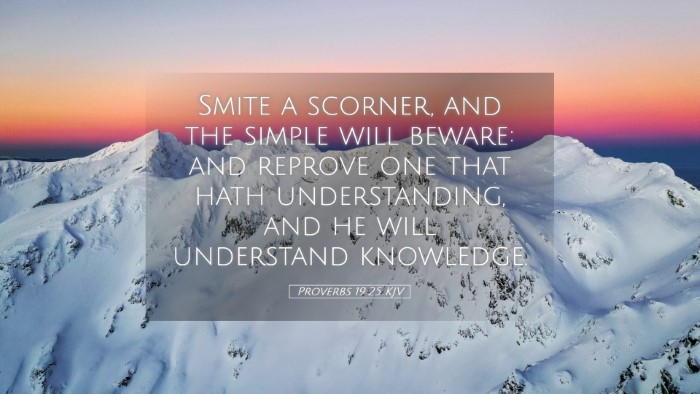Commentary on Proverbs 19:25
Verse: "Smite a scorner, and the simple will beware: and reprove one that hath understanding, and he will understand knowledge."
Introduction
The book of Proverbs, known for its practical wisdom, provides insights into the nature of folly and wisdom. Proverbs 19:25 addresses the complex interaction between correction, scorn, and understanding. This verse offers a rich ground for discussion, reflecting on human behavior, the consequences of scorn, and the journey toward wisdom.
Analysis and Insights
1. The Nature of Correction
Correction is a theme that resonates throughout the Proverbs. The necessity of discipline is emphasized, and in this context, we consider the words of Matthew Henry. Henry points out that "to smite" conveys not just physical punishment but a broader sense of correcting harshly but necessarily. The intent is to bring awareness to the simple, who often lack discretion.
2. The Scorner Defined
Who is the "scorner"? According to Albert Barnes, a scorner is one who openly rejects wisdom, mocking those who seek it. The scorner represents not just foolishness but a hostility towards the truth. The act of smiting can also be seen as an act of protection for those who are naive, illustrating that sometimes severe measures may be needed to convey the seriousness of folly.
3. The Simple and the Wise
- The Simple: Often defined as those who lack the experience or understanding necessary to discern right from wrong. Adam Clarke notes that the "simple" can gain by witnessing the consequences faced by scorners.
- The Wise: In contrast, the wise one, when reproved, will recognize the value in correction and strive to absorb knowledge. Clarke emphasizes the transformative power of wisdom and the willingness of the wise to learn from reproof.
4. The Purpose of Reproof
Reproof serves a dual purpose: it warns the naive and instructs the wise. Reproving the wise is an opportunity for growth. Matthew Henry suggests that a wise person will not only accept correction but will also seek a deeper understanding. The tension between reproof and acceptance is pivotal to personal and spiritual development.
5. The Outcomes of Reproof
The verse presents a consequential framework: correcting a scorner engages in a visible act that alters the perception of the simple. It indicates that the presence of consequences can lead to wisdom's recognition among observers. As noted by Barnes, this creates a ripple effect, whereby the actions of those in authority or those seen as wise can influence the broader community.
6. Applications for Today's Believers
In contemporary settings, the exhortation extends beyond mere physical reprimands; it invites a relational approach to correction and wisdom. Pastoral leaders are encouraged to engage in grace-filled corrections, helping others to see wisdom's value over a life of folly.
Moreover, this serves as a reminder for individuals to cultivate humility and openness towards reproof, fostering a lifelong learning environment.
Conclusion
Proverbs 19:25 encapsulates the delicate yet crucial nature of personal development within the community of faith. It asserts that correction is integral to wisdom and instructs that reproof should not be shunned. Instead, individuals must learn to navigate these dynamics thoughtfully—making room for both the scorner’s and the simple’s recognition of understanding.
Final Thoughts
Public domain commentators provide a foundational understanding that emphasizes the value of correction and the implications it bears on wisdom. By applying these principles, current practitioners of faith—whether pastoral ministers or laypeople—can foster an environment of grace, understanding, and growth as they guide others on their spiritual journeys.


